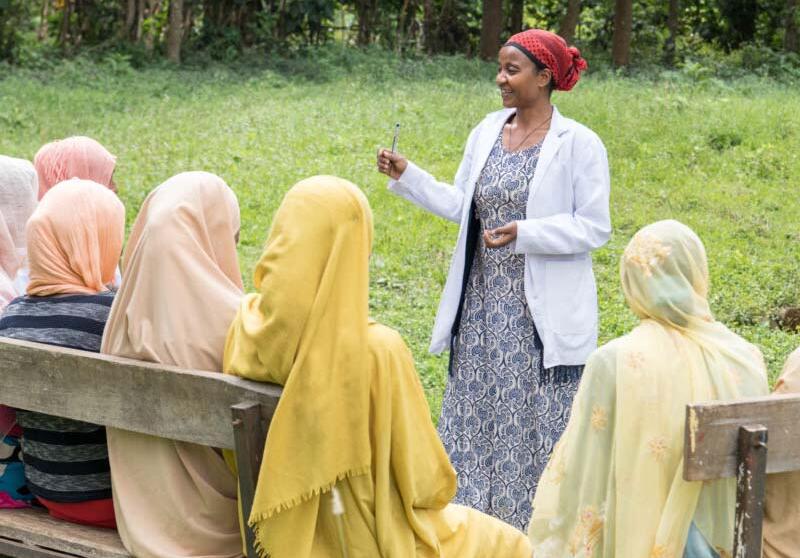Dear colleagues,
Last week, we shared the news that Maria Paula Martinez will become the first Managing Director of the Latin America and Caribbean Regional Hub. We’re so pleased to welcome her aboard. Maria is well suited to lead our work in the region, as she brings a uniquely intersectional lens and clear passion to drive universal access to voluntary family planning. Her experience in expanding programs and building intersectional partnerships will be critical, given the need to work across multiple sectors in the Latin America and Caribbean region.
Our global support network has indeed been busy these past few weeks. The North America and Europe Hub, in partnership with the East and Southern African Hub, hosted two critical meetings recently. The first in Abidjan, Cote D’Ivoire, working with faith leaders in the region to advance access to rights-based family planning in their communities. The second was the annual convening of the Performance, Monitoring, and Evidence (PME) Working Group in Nairobi, where some of the world’s leading experts in family planning data collection and analysis gathered to discuss the latest trends, emerging themes, and practices around family planning data.
We’re taking a moment internally to pause and reflect on the work we’ve accomplished this year, and how we can move ahead and best address the biggest challenges facing our community: things like climate change, inclusion, and gender equality among other big picture issues. We hope to continue to put family planning where it belongs: right in the center of these global conversations about society and its development. Family planning is a uniquely intersectional issue, so our work, our priorities, and our vision must be uniquely intersectional too. Onward!
Sincerely,
Samukeliso Dube FP2030 Executive Director
Faith leaders take action on rights-based family planning
This month, FP2030 brought together two seemingly different worlds: faith and family planning. Given a persistent narrative that religion is at odds with family planning, these might seem like two communities that won’t work with each other, but in fact the opposite is true: Many faith leaders and organizations believe ensuring access to rights-based family planning, autonomy, and gender equality is a religious imperative.
Hope and heartbreak for Pakistan in the era of climate change
Although Pakistan is one of the countries where climate change is wreaking the greatest havoc, Pakistanis have only made modest contributions to global carbon emissions—less than 1 percent. Just as climate change is having a disproportionate impact on Pakistan, those impacts are felt the most among marginalized populations, accentuating pre-existing inequalities. Women and girls stand at the forefront of adversity.
Providing Access to All: Disability and Family Planning
16% of the world’s population has a disability according to the World Health Organization (WHO), and yet most sexual and reproductive health care programs don’t adequately include them – as recipients of healthcare services and as decision makers and program implementers.
Humanitarian crisis in South Sudan blocks access to family planning services
A worsening crisis in South Sudan caused by internal conflict has left over four million people displaced. An estimated 85% of these are women and children. This conflict and resulting mass displacement has prevented many people, including women and girls, from accessing essential healthcare services – particularly family planning information and services, which are not always included in crisis response.
Building FP2030
Maria Paula Martinez has just joined FP2030 as the Managing Director of the Latin America and Caribbean Regional Hub. In her new role, Maria will be responsible for overseeing and implementing the regional hub’s strategic initiatives, forging new partnerships, and establishing FP2030 as a key partner in the robust regional reproductive health and rights sector.
In Other News
The annual convening of the Performance, Monitoring, and Evidence (PME) Working Group was held in Nairobi, where some of the world’s leading experts in family planning data collection and analysis gathered to discuss the latest trends, emerging themes, and practices around family planning data.The Population Institute recently published a report entitled “Connecting the Dots: Sexual and Reproductive Health and Rights as Prerequisites for Global Gender Equality and Empowerment.” This report connects the need for the US to advance sexual and reproductive health and rights, and how that will benefit global policy and gender empowerment. A new report is out by the Asian-Pacific Resource & Research Centre for Women (ARROW). “Reproductive Justice: Recalibrating the SRHR Agenda” discusses reproductive justice in the context of transgender rights, people with disabilities, migrant women, and more. A new paper from the International Rescue Committee, the International Planned Parenthood Federation, Options, and MSI Reproductive Choices was published in the Global Health: Science and Practice journal. It focuses on improving the delivery of high-quality and accessible sexual and reproductive health services and family planning in situations of crisis and/or for migrant populations. “Infertility Matters: Embracing the Gendered Spectrum of Stigma, Needs, and Experiences in Sub-Saharan Africa” comes from the Interagency Gender Working Group’s Take the Mic series. The series highlights lessons learned and best practices from and innovative approaches to gender transformative programming and research. Track 20 has published briefs from 45 countries in English and French to accompany their Method Information Index. The MII serves as a proxy for quality of counseling and reflects the extent to which women are informed about side effects and alternate methods.
